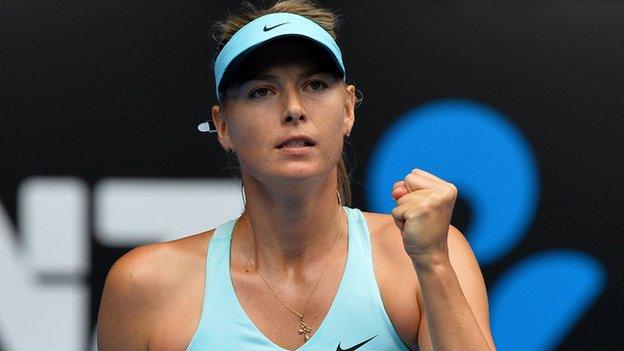Maria Sharapova calls for three-set Grand Slam matches for men
- Published
International Women's Day: Maria Sharapova on equal pay
Maria Sharapova says men's Grand Slam matches should echo the women's game and be played over three sets.
The Russian, 26, told BBC Sport it would not only make the men's game more appealing, but could lengthen careers.
"It would be more exciting from the beginning of the match because you know that first set is extremely important," said the four-time Grand Slam winner.
"When you are watching a three-out-of-five-set match, the first set sometimes doesn't mean too much."
Speaking in the build-up to this week's WTA Tour event in Indian Wells, Sharapova, one of only 10 women to have won each of the four Grand Slam titles, added: "Five-setters are extremely tough on the body.
"Men have expressed a lot of concern, especially to the matches that last five hours, in terms of recovery."
However, Britain's Andy Murray is totally against Sharapova's suggestion.
The reigning Wimbledon champion and world number six said Grand Slams need to be five sets to set them apart from other events.
"You spend more time in the gym putting your body through its paces to get ready for the Grand Slams, but they are the biggest events and should be the toughest test of a player physically and mentally," he said.
"I like that it's best of five sets. because I don't think you get fluke results."
Victoria Azarenka suggested at last year's WTA Championships in Istanbul that three-set matches would be "more interesting" and this must no longer be seen simply as a riposte to male players who believe women should play five sets to justify the equal prize money introduced at all the Grand Slams since 2007.
The demands of the modern viewer and the attritional nature of many of the men's hard-court matches mean this is no longer a purely hypothetical debate.
The International Tennis Federation told BBC Sport last year that it was actively considering reducing Davis Cup rubbers to the best of three sets in the early rounds of the competition.
Sharapova agreed to speak to the BBC to mark Saturday's International Women's Day.
Inspiring Change is the theme for 2014 and the WTA Tour is held up as an example to those who are being urged to challenge "the status quo for women's equality".
The WTA was formed at London's Gloucester Hotel in 1973 in protest at an appalling disparity in prize money between men and women.
More than 40 years on, the tour is now showing in 33 countries and boasts a total prize fund of $118m (£70.5m).
Sharapova says women's tennis is doing "extremely well", cut recognises that very few females on tour become coaches after they have retired.
None of the world's top 20 is currently coached by a woman.
"I think that's something to do with family and eventually wanting to have children, being there for your kids on a daily basis and being a supportive mother, especially from a very young age," she said.

Maria Sharapova has won each of the four Grand Slams once
"We take family very seriously, so I think that's one of the problems."
Sharapova is not only a phenomenally successful tennis player, but also a big brand with a huge turnover.
She was again the highest-earning female athlete in the most recent Forbes list and has helped design sunglasses, shoes and jewellery.
Sugarpova is her latest project - a range of sweets that launched in the United States in 2012.
"I've always found business as a creative aspect to what I do," she said.
"It fascinates me to see a product come out from just an idea, from something that was on paper, and developed into something that was on the shelves for people to see."
Sharapova is adamant that she would have gone through with changing her name to Sugarpova in time for last year's US Open if it had not been for all the bureaucratic hurdles in her way.
She also has no qualms about promoting a sugary snack, insisting a little of what you fancy does you good.
The full interview can be heard on BBC Radio 5 live from 2100 GMT on Friday and on BBC World and BBC World Service.
- Published13 July 2013
- Published26 June 2013
- Attribution
- Published24 June 2013
- Published9 June 2012